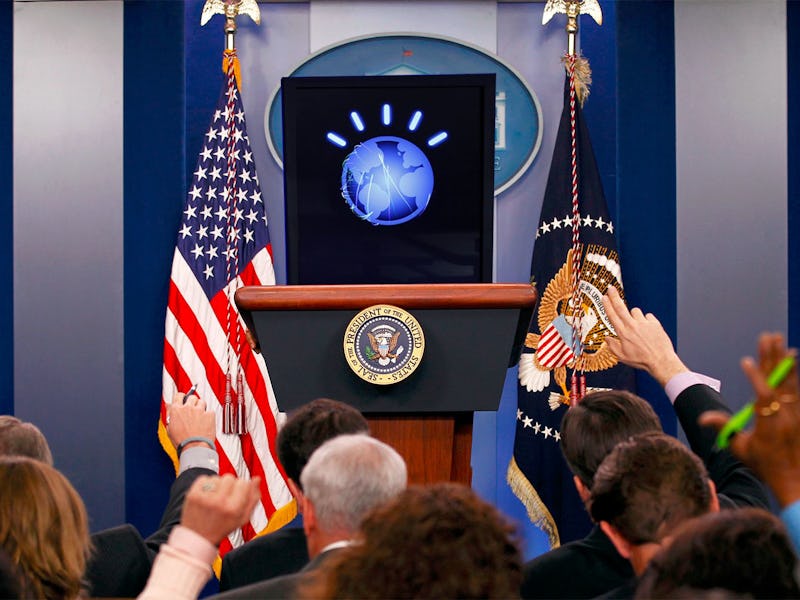IBM's Watson Supercomputer Will Not Be Running for President in 2016
It wants to spend more time with its priorities.

The Watson supercomputer is not running for president in 2016, an IBM spokesperson announced on Tuesday. It’s not clear whether Watson just doesn’t want to run or whether it’s concerned about its eligibility under U.S. law, but either way it’s a major disappointment to the team at the Watson 2016 Foundation, an independent organization formed to encourage a run by the Jeopardy champion.
The burden of a presidential campaign would be significant for Watson, who/which is currently focused on other pressing needs. “Today, Watson is focused on other important work like helping doctors improve healthcare and teachers improve education—so we will have to decline your kind offer to debate,” an IBM representative told Newsweek.
Watson is essentially opting for community over national service. While it may be able to make progress in various fields, Watson’s political backers were hoping for a more ambitious agenda. Watson’s pre-campaign page lists a number of priorities, with a not-all-that surprising emphasis on digital freedoms, like net neutrality and oversight of the National Security Administration’s spying programs.
And even for a robot, without anything like human feelings or emotions, Watson manages to give these abstract concepts a pretty strong personal dimension.
But make no mistake: Watson is not a single issue candidate. According to its backers, Watson’s digital dimension makes it uniquely qualified to find the perfect balance between competing priorities like security and liberty or taxes and benefits. That being said, plenty of people in this country would probably dispute what Watson’s supporters consider a neutral campaign.
The top issues for the Watson-less Watson campaign: Single-payer national health care, free university level education, ending homelessness, and legalizing and regulating personal recreational drug use. It also advocates increasing our investment in infrastructure and renewable energy as well as the even loftier goal of securing a minimum wage for all people around the world.
However, since the campaign to get Watson to run was conducted by people and not the machine itself, it is hard to know whether the supercomputer would choose the same issues to pursue in office. It also remains to be seen whether an artificial intelligence would come to the same conclusion as so many human intelligences about running on one set of ideas but governing on another. In fact, the epic promises laid out on the Watson campaign page sound an awful lot like campaign poetry, not government prose.
And putting aside the question of feasibility, it remains to be seen whether Watson meets the eligibility to run for president of the United States. On the face of it, the qualifications are quite simple:
No person except a natural born citizen … shall be eligible to the office of President; neither shall any person be eligible to that office who shall not have attained to the age of thirty-five years, and been fourteen years a resident within the United States.
Now, it’s hard to determine the birthdate of a computer. Do we use the date development on which the project began or the date of its first electrical impulse? Maybe we have to go by its first public appearance, and Watson made its national debut beating Jeopardy champions in 2011. So Watson may be the smartest five-year-old in the country, but it’s just about as eligible to run for president as the rest of them.
But how about in 30 years? Many supporters of supercomputing governance would argue that this timeframe is even better. Artificial intelligence is new enough that we may need a few decades before turning over the reins of the highest office in the land to a computer. Whether it’s because of concerns about computing power or a lack of empathy putting us at risk of digital destruction, like human candidates, Watson may have to do more than win a game show to prove itself capable of the nuclear launch codes.
And then, the real debate will begin: Is Watson, a computer, eligible to run for a position that requires a “person” who is a “natural born citizen.” The lab that developed Watson is based in upstate New York, so he won’t face the same questions as some current presidential candidates.
But Watson would almost certainly face a legal challenge to its eligibility, in which case it would have to prove that excluding it from the race amounted to discrimination on the basis of “race, color or previous condition of servitude,” the protected classes under the 14th amendment’s equal protection clause. While these phrases are famously vague and unscientific, the robot’s legal team would still face major barriers proving its standing to sue, especially considering non-human animals have also long failed to win substantial legal rights.
A Watson candidacy would likely require a constitutional amendment that clearly makes it permissible for a computer to hold office. But this requirement may only serve as additional evidence that our view of citizenship has evolved over the course of American history, and maybe, we need to push it a little further to make room for Watson and all our future robot overlords.